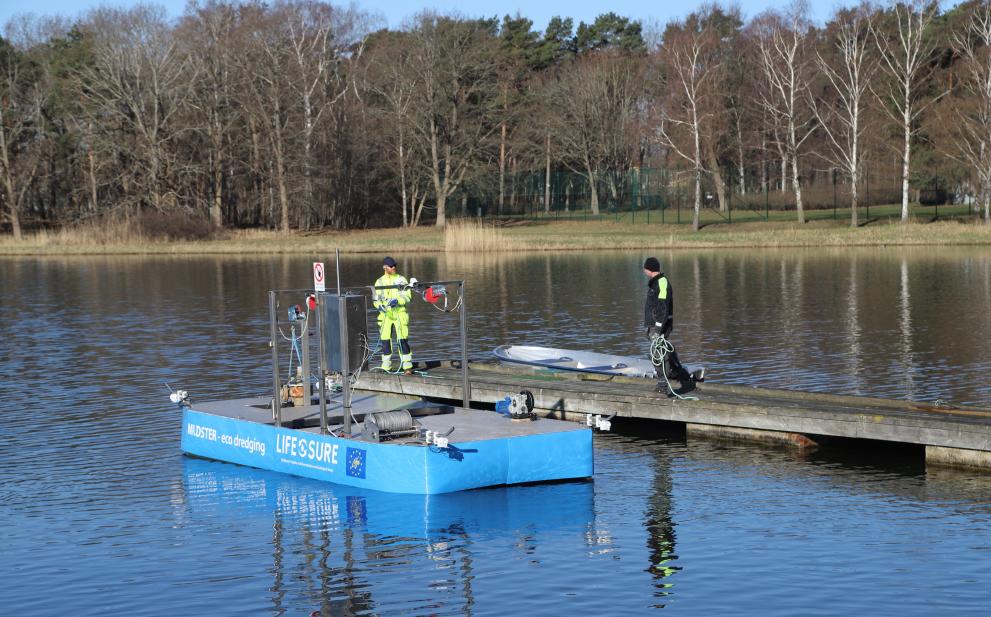
‘The Baltic Sea is not in good shape,’ Virginijus Sinkevičius, Commissioner for Environment, Oceans and Fisheries, told the conference. ‘It’s time to save this sea for the people who live around it, for our fishers, and for future generations.’
Held in Palanga, Lithuania, the conference focused on three themes: environment and fisheries; the blue economy; and unexploded munitions. It gathered together political decision-makers, scientists, non-governmental organisations (NGOs) and business leaders. LIFE Programme is contributing to the discussion with a variety of projects ranging from tackling plastic waste pollution, to protecting birds, and to restoring coastal habitats.
Among the LIFE projects already making an impact on the environment and fisheries is the ambitious eight-year, EUR 23.7 million LIFE Rich Waters. The project tackles eutrophication - algae blooms caused by agricultural fertiliser run-off - in the northern Baltic Sea River basin. Around 80 per cent of the basin has a ‘less than good’ ecological status, while approximately 550 streams, 350 lakes and 167 coastal waters are at risk.
‘The tools developed by LIFE Rich Waters are new, we haven’t had them before,’ says Ernset Witter, project leader at Örebro County Council in Sweden. ‘With their help we can get a much better look at the lakes where there is a problem and what measures may be needed.’
LIFE CleanEST, covering 240,000 hectares of the East Estonia river basin, has ten years and EUR 17 million to clean up one of the Baltic’s most polluted areas. ‘In the past 30 years, nutrient pollution in the Baltic Sea has been reduced by roughly 50 percent,’ says Mari Sepp, CleanEst project manager. ‘The main focus [of the project] has shifted from nutrients to dangerous substances such as marine litter, drug residues, shipping and alien species.’
In Sweden, a five-year LIFE SURE project developed a remote-controlled, low-cost, environmentally friendly dredger nicknamed the ‘Mudster’, to remove harmful sediments from Malmfjärden bay. The Mudster is still being used to produce high-nutrient soil for growing food and for manufacturing construction building materials.
Meanwhile, the LIFE Fit for Reach project is helping small and medium-sized businesses reduce the amount of toxic chemicals discharged into the environment. ‘It’s always better to concentrate on prevention instead of trying to cure existing problems,’ says project expert Jolita Kruopiene. ‘It’s a win-win - good for the environment, for clients, for workers and for companies.’
In addition to cleaning up the Baltic Sea, the LIFE projects also prioritise enhancing the conditions of coastal bird species. Better BirdLIFE - a seven-year project covering 12 Natura 2000 sites in Denmark and Germany - improves coastal habitats for 14 threatened species in the West Baltic Sea. Initiatives include a floating raft for hundreds of breeding terns and artificial stone reefs where mussels - the favourite food of eider ducks - can thrive.
Biologist Søren Ring points out that it’s not just birds that benefit. ‘By the end of the project, apart from establishing excellent breeding locations for our birds, we will have delivered many new nature experiences for many people.’
Our Baltic Conference was an opportunity to discuss, collaborate and agree on joint action. The Our Baltic ministerial declaration links to the EU Biodiversity Strategy for 2030, the Farm to Fork Strategy and the Zero Pollution Action Plan, as well as the proposal for a revised Urban Waste Water Directive, the implementation of the Marine Strategy Framework Directive and the Common Fisheries Policy.
Details
- Publication date
- 11 October 2023
- Author
- European Climate, Infrastructure and Environment Executive Agency

